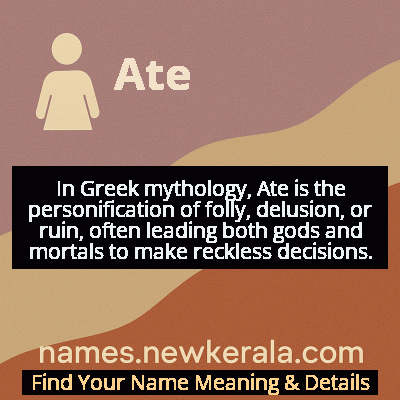Ate Name Meaning & Details
Origin, Popularity, Numerology Analysis & Name Meaning of Ate
Discover the origin, meaning, and cultural significance of the name ATE. Delve into its historical roots and explore the lasting impact it has had on communities and traditions.
Name
Ate
Gender
Female
Origin
Greek
Lucky Number
8
Meaning of the Name - Ate
In Greek mythology, Ate is the personification of folly, delusion, or ruin, often leading both gods and mortals to make reckless decisions.
Ate - Complete Numerology Analysis
Your Numerology Number
Based on Pythagorean Numerology System
Ruling Planet
Saturn
Positive Nature
Ambitious, efficient, realistic, and authoritative.
Negative Traits
Materialistic, stressed, confrontational, and can be overly ambitious.
Lucky Colours
Dark blue, black.
Lucky Days
Saturday.
Lucky Stones
Blue sapphire, amethyst.
Harmony Numbers
2, 4, 6.
Best Suited Professions
Business leaders, managers, financial services, law enforcement.
What People Like About You
Leadership, determination, organizational skills.
Famous People Named Ate
Ate (Mythological)
Greek Goddess
Personification of mischief, delusion, and reckless impulse in Greek mythology
Ate van der Burg
Dutch Politician
Member of the Dutch Senate and prominent figure in Dutch politics
Ate de Jong
Film Director
Dutch film director known for 'Drop Dead Fred' and 'The Lift'
Ate Feenstra
Academic Researcher
Notable researcher in media studies and cultural analysis
Name Variations & International Equivalents
Click on blue names to explore their detailed meanings. Gray names with will be available soon.
Cultural & Historical Significance
The cultural impact of Ate extends beyond mythology into philosophy and psychology. Greek tragedians used the concept of Ate to explore themes of hubris and the tragic flaw in human character. In philosophical terms, Ate represents the antithesis of sophrosyne (moderation and self-control), serving as a cautionary symbol about the dangers of excess and impulsive behavior. Her presence in cultural narratives helped ancient Greeks conceptualize and discuss the complex relationship between fate, personal responsibility, and the external forces that can cloud human judgment, making her an enduring symbol in Western thought about human fallibility and the importance of wisdom.
Extended Personality Analysis
Individuals named Ate often exhibit a fascinating blend of creativity, independence, and intellectual curiosity. Their mythological namesake suggests they may possess a natural charisma and persuasive ability that can influence others, though this might sometimes manifest as leading people toward unconventional paths. Ate-named individuals typically display quick thinking and mental agility, capable of seeing solutions and perspectives that others might miss. They often challenge established norms and aren't afraid to question authority, making them natural innovators and change-makers.
However, the shadow side of these personality traits includes potential struggles with impulsivity and a tendency to act before fully considering consequences. The mythological association with folly suggests that Ate-named individuals might need to consciously develop patience and emotional regulation. They often learn through experience that their natural confidence and quick decision-making can sometimes lead to unintended outcomes. With maturity, they typically learn to balance their innovative spirit with practical wisdom, transforming the potential for 'folly' into creative risk-taking that yields positive results. Their journey often involves learning to harness their natural influence responsibly while maintaining their unique perspective on the world.
Modern Usage & Popularity
In contemporary naming practices, Ate remains an exceptionally rare choice, primarily selected by parents with strong interests in classical mythology or those seeking distinctive names with deep historical roots. The name's usage is most common among academic families, classical scholars, and individuals in creative fields who appreciate its mythological significance. Interestingly, in the Netherlands, Ate appears more frequently as a masculine name, creating occasional gender confusion in international contexts. Modern name statistics show that Ate ranks outside the top 1000 names in most Western countries, with occasional spikes in usage following popular media featuring Greek mythology. Parents choosing this name often do so for its uniqueness and intellectual appeal, though many consider pairing it with more conventional middle names to balance its strong mythological associations. The name's rarity makes it a distinctive choice that almost always requires explanation of its origins and meaning.
Symbolic & Spiritual Meanings
Symbolically, Ate represents the complex interplay between reason and emotion, serving as a powerful metaphor for the human capacity for self-deception and irrational behavior. She embodies the concept of 'temporary madness' that can overcome even the most logical minds, symbolizing those moments when passion, pride, or ambition cloud judgment. In psychological terms, Ate represents the shadow self that acts on impulse without proper consideration of consequences. Her symbolism extends to warning about the dangers of hubris and the importance of self-awareness in personal growth. However, Ate also carries positive symbolic meanings as a representation of creative disruption and the necessary chaos that sometimes precedes innovation and change. She symbolizes the breaking of conventional patterns and the courage to follow unconventional paths, making her a complex figure that represents both the risks and potential rewards of thinking differently. In modern interpretation, Ate can be seen as symbolizing the creative tension between tradition and innovation, caution and risk-taking, that drives human progress.

